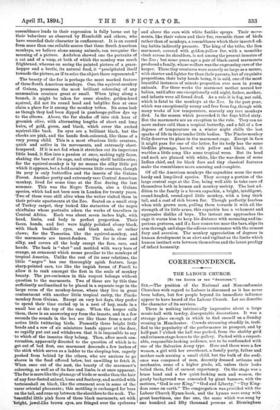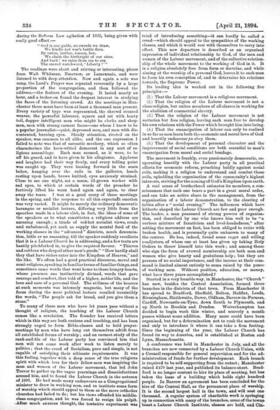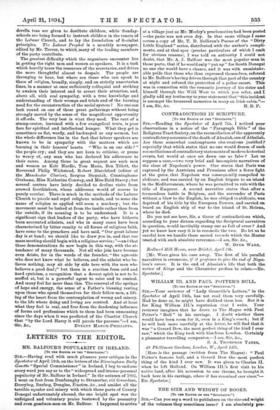CORRESPONDENCE.
THE LABOUR CHURCH.
[To THE EDITOR OP THE " BPECTLTOH."]
Stn,—The position of the National and Nonconformist Churches with regard to Labour is discussed as it has never been before, but few people beyond its immediate influence appear to have heard of the Labour Church. Let me describe the character of its services.
There is nothing intrinsically impressive about a large music-hall with tawdry, disreputable decorations. It was a . strange place enough in which to find oneself on a Sunday evening in Manchester. Crowds streaming steadily in, testi- fied to the popularity of the performance in prospect, and by half-past 7 o'clock the hall was packed, from the shabby go)d and crimson stage-boxes to the gallery. Packed with a respect- able, responsible-looking audience, not to be confounded with one of the Salvation Army type. Here and there were a few women, a girl with her sweetheart, a. family party, father and mother each nursing a small child, but the bulk of the audi- ence was composed of men, decently dressed artisans and mechanics, some of a higher grade, all, unless their looks belied them, fall of earnest expectancy. On the stage was a brass band and a few quiet-looking men and women, the gaudy background was concealed by giant banners, with the mottoes, "God is our King," "God and Liberty," "Thy King- dom come on earth." The congregation was provided with the Labour Church Hymn-book, and the hymns were sung with great heartiness, one fine one, the same which was sung by one hundred and fifty thousand persons at Birmingham during the Reform Law agitation of 1832, being given with really good effect :—
" God is our guide, no swords we draw, We kindle not war's battle fires. By union, justice, reason, law,
We claim the birthright of our sires. And hark ! we raise from. sea to sea The sacred watchword, Liberty !
The readings were short and stirring or interesting, pieces from Walt Whitman, Emerson, or Lamennais, and were listened to with deep attention. No and again a solo was
sung, the Lord's Prayer was repeated reverently by a large proportion of the congregation, and then followed the address,—the feature of the evening. It lasted nearly an hour, and a looker-on found the deepest interest in studying the faces of the listening crowd. At the meetings in Man- chester there must have been at least a thousand men present. Every variety of type was represented, the shrewd stunted weaver, the powerful labourer, square and set with heavy toil, dapper intelligent men who might be clerks and shop-
men, men with strong earnest faces—one whom I knew to be a popular journalist—quiet, depressed men, and men with dis-
contented, burning eyes. Steady attention, riveted on the speaker, was common to all alike, and the one expression I failed to note was that of sarcastic mockery, which so often characterises the keen-witted democrat in any sort of re- ligious assemblage. Each man seemed, as it were, to be off his guard, and to have given in his allegiance. Applause and laughter had their way freely, and every telling point was caught up. They were leaning forward in the seats below, hanging over the rails in the galleries, heads resting upon hands, brows knitted, eyes anxiously strained. Close to me one night, sat a mean, ill-grown worker with sad eyes, to which at certain words of the preacher he furtively lifted his worn hand again and again, to clear
away the tears. I was at a good many of these meetings in the spring, and the response to all this expectadt emotion
was very varied. It might be merely the ordinary democratic harangue or socialist lecture, differing very little from the speeches made in a labour club, in fact, the ideas of some of the speakers as to what constitutes a religious address are amusing enough ; a tirade of red-hot socialist views, crude and unbalanced, yet such as supply the mental food of the working classes in the "advanced" districts, much denuncia- tion, little or no reasoning, till the speaker suddenly recollects that it is a Labour Church he is addressing, and a few texts are hastily pitchforked in, to give the required flavour. "Thieves and robbers who despoil other men's goods." "How hardly shall they that have riches enter into the Kingdom of Heaven," and the like. We often had a good practical discourse, moral and semi-religious, speaking in familiar terms of familiar things, and sometimes came words that went home to those hungry hearts, whose presence one instinctively divined, words that gave courage and comfort, that told of a higher, nobler life, and the love and care of a personal God. The stillness of the hearers at such moments was intensely magnetic, but many of the faces during the mere political lecture recalled irresistibly the words, "The people ask for bread, and you give them a atone."
To many of these men who have let years pass without a thought of religion, the teaching of the Labour Church comes like a revelation. The founder has received letters which in this way are both curious and touching, and has been strongly urged to form Bible-classes and to hold prayer- meetings by men who have long cut themselves adrift from all established forms of worship ; and an earnest study of the rank-and-file of the Labour party has convinced him that men will not come week after week to listen merely to politics; that the creed of Socialism, pure and simple, is not capable of satisfying their ultimate requirements. It was this feeling, together with a deep sense of the true religions
spirit with which love for their fellow-men was inspiring the men and women of the Labour movement, that led John Trevor to gather up the vague yearnings and dissatisfactions
around him, and to found the Labour Church in the autumn of 1891. He had made many endeavours as a Congregational minister to draw in working men, and to institute some form of worship which should appeal to them as the more orthodox churches had failed to do; but his views offended his middle- class congregation, and he was forced to resign his pulpit. -After much anxious thought, the tentative experiment was
tried of introducing something—it can hardly be called a. creed—which should appeal to the sympathies of the working classes, and which it would rest with themselves to carry into. effect. This new departure is described as an organised expression of individual relationship to God, of the men and women of the Labour movement, and of the collective relation- ship of the whole movement to the working of God in it. It is a religion absolutely free from form or doctrine, and while- aiming at the worship of a personal God, leaves it to each man to form his own conception of, and to determine his relations. towards, the Supreme Power.
Its leading idea is worked out in the following five- principles :— (1.) That the Labour movement is a religious movement.
(2.) That the religion of the Labour movement is not a class-religion, but unites members of all classes in working for the abolition of commercial slavery.
(3.) That the religion of the Labour movement is not sectarian but free religion, leaving each man free to develop.
his own relations with the Power which brought him into being..
(4.) That the emancipation of labour can only be realised in so far as men learn both the economic and moral laws of God and heartily endeavour,to obey them.
(5.) That the development of personal character and the- improvement of social conditions are both essential to man's- emancipation from moral and social bondage.
The movement is frankly, even passionately democratic, co- operating heartily with the Labour party in all practical efforts for economic reform, preaching boldly against social evils, making it a religion to understand and combat those' evils, upholding the organisation of the community's highest interests, striving for the coming of God's Kingdom upon earth.
A real sense of brotherhood animates its members, a con- sciousness that each one bears a part in a great moral order, and can take an active share in the management, from the- organisation of a labour demonstration, to the clearing of tables after a "social evening." The influences which have' hitherto shaped the Labour Church are few and poor enough.. The leader, a man possessed of strong powers of organisa- tion, and described by one who knows him well to be "a curious mixture of fanaticism and level-headedness," after setting the movement on foot, has been obliged to retire with broken health, and is personally quite unknown to many of the centres. He has, indeed, found some eager and willing coadjutors, of whom one at least has given up taking Holy Orders to throw himself into this work ; and among those- who sign the form of avowed membership are both men and women who give hearty and gratuitous help ; but they are persons of no social importance, and the income at their com- mand is limited almost entirely to sums raised by the pence' of working men. Without position, education, or money, what have three years accomplished ?
Started in a very humble way, in Manchester, the" Church" has now, besides the Central Association, formed three- branches in the districts of that town. From Manchester it' has spread to Bradford, Sheffield, Bolton, Halifax, Leeds, Birmingham, Slaithwaite, Dover, Oldham, Barrow-in-Fmness,. Cardiff, Newcastle-on-Tyne, down South to Plymouth, and up North to Brechin and Dundee. Wolverhampton has. decidedto begin work this winter, and scarcely a month. passes without some addition. Many more could have been organised, but for a determination not to rush the movement. and only to introduce it where it can take a firm footing. Since the beginning of the year, the Labour Church has. foundits way to America, and is established at Boston and Lynn, Massachusetts.
A conference was held in Manchester in July, and all the
branches are now connected by a Labour Church Union, with a Council responsible for general supervision and for the ad- ministration of funds for further development. Each branch is required to be self-supporting from the outset ; Manchester raised 2470 last year, and published its balance-sheet. Brad- ford is no longer content to hire its place of meeting, but has taken the lease of a building which holds eight hundred. people. In Barrow an agreement has been concluded for the- hire of the Central Hall, as the permanent place of worship. It is the second largest hall in the town, and will seat one thousand. A regular system of charitable work is springing up in connection with many of the branches, some of the towns boast a Labour Church Institute, classes are held, and Chi.- derella teas are given to destitute children, while Sunday. schools are being formed to instruct children in the tenets of -the Labour Church, and to lay the foundation of Socialist principles. The Labour Prophet is a monthly newspaper, -edited by Mr. Trevor, to which manyof the leading members of the party contribute.
The greatest difficulty which the organisers encounter lies in getting the right men and women as speakers. It is a task which heavily taxes the resources of the secretaries, and drives the more thoughtful almost to despair. The people are thronging to hear, but where are those who can speak to -them of religion, broadly, simply, and on strictly unsectarian lines, in a manner at once sufficiently colloquial and striking to awaken their interest and to arrest their attention, and, above all, with real sympathy, with a true knowledge and understanding of their wrongs and trials and of the burning need for the reconstruction of the social system ? No one can look round on one of these great gatherings without being strongly moved by the sense of the magnificent opportunity it affords. The very best is what they need. The rant of a -stump-orator, leavened with a few evangelical texts, is poor -fare for spiritual and intellectual hunger. What they get is -sometimes as flat, wordy, and hackneyed as any sermon, but -the whole difference lies in the fact that labour speakers are known to be in sympathy with the matters which are 'burning in their hearers' hearts. "Who is on our side ? " -the people cry; and they are not keen to criticise, or prone to weary of, any man who has declared his adherence to their cause. Among those in great request are such men and women as Keir Hardie, Tom Mann, Ben Tillett, the _Reverend Philip Wicksteed, Robert Blatchford (editor of the Manchester Clarion), Sergius Stepniak, Cunninghame 'Grahame, Miss Katherine Conway, and Miss Enid Stacey; but several centres have lately decided to decline visits from -avowed freethinkers, whose addresses would of course be purely secular. There is much in the methods of the Labour -Church to puzzle and repel religious minds, and to some the -name of religion so applied will seem a mockery ; but the -movement must be looked at from the inside rather than from the 'outside, if its meaning is to be understood. It is a -significant sign that leaders of the party, who have hitherto been accounted atheists, and who in many cases have been -characterised by bitter enmity to all forms of religious faith, have come to the preachers and have said, "Our great labour -day is at hand; we should like to draw you in, and that our mass meeting should begin with a religious service ; "—and that -these demonstrations do now begin in this way, with the at- tendance of many thousands. Not all who join have become -even deists, for in the words of the founder, "the agnostic who does not know what he believes, and the atheist who be- lieves nothing, may sit side by side here with the man who believes a good deal ;" but there is a reaction from cold and -hard cynicism, a recognition that a devout spirit is not to be -scoffed at, but is a powerful agent to raise and to control. And many feel far more than this. The renewal of the springs -of hope and energy, the sense of a Father's blessing resting upon those who spend themselves for their fellow-men, a lift- ing of the heart from the contemplation of wrong and misery, to the life where doing and loving are centred. And at least what they feel is real, and free from the deadening influence -of forms and professions which to them had been unmeaning -since the days when it was predicted of the Chartist Church -that " by the Lord Harry it will puzzle the parsons."—I am,




































 Previous page
Previous page